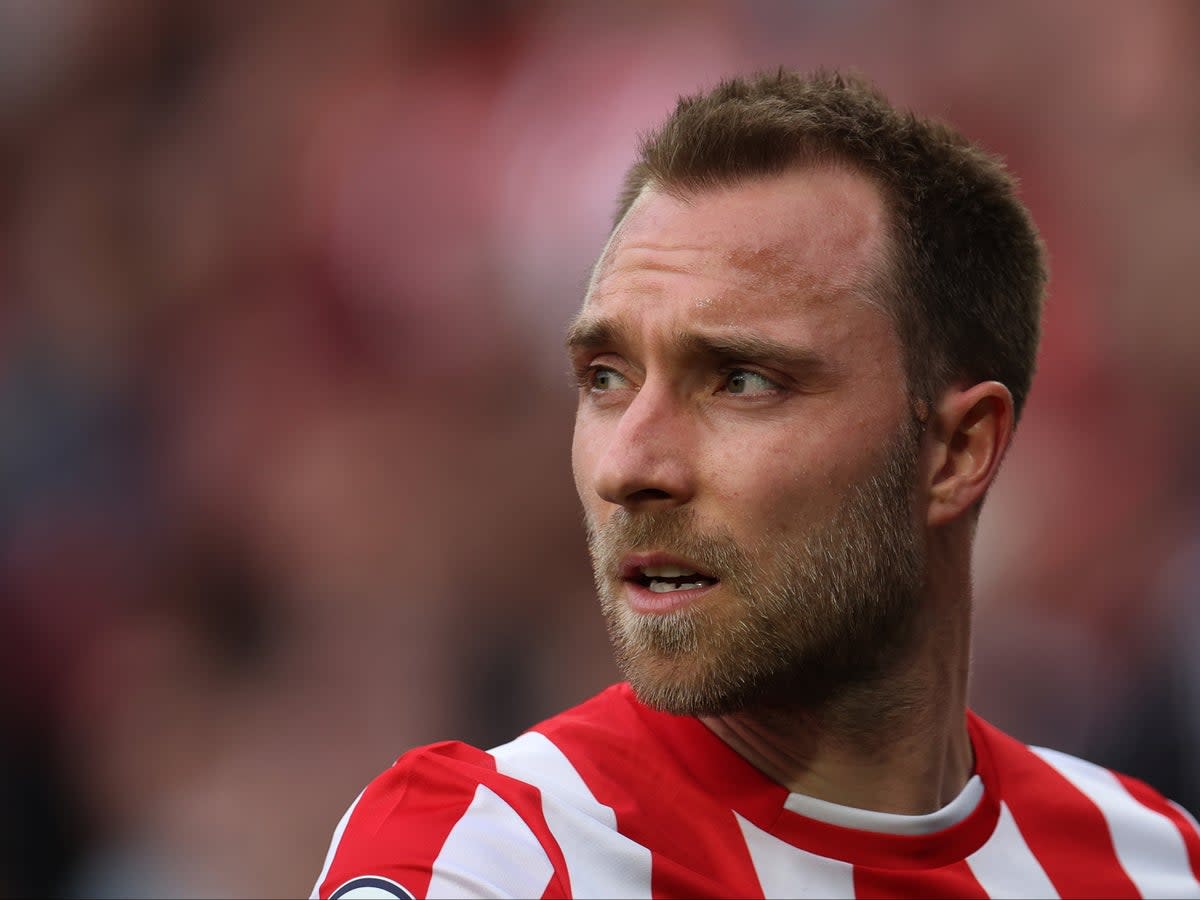Can a different, deep-lying Christian Eriksen transform Manchester United?

- Oops!Something went wrong.Please try again later.
- Oops!Something went wrong.Please try again later.
In the ambulance that delivered Christian Eriksen from Parken to the emergency department of Copenhagen’s largest hospital, he told the attendant paramedics that they could take his boots because he would no longer be needing them. The cardiac arrest that had almost tragically ended his life while playing in last summer’s European Championship had surely ended his career, he thought. And yet a little more than a year later, he has signed for Manchester United.
Eriksen’s recovery and extraordinary return to play was the feel-good story of last season, especially as it ended with him helping newly-promoted Brentford to comfortably avoid relegation. Thomas Frank’s side were only three points clear of the drop before his first start in early March but in his 11 appearances, they averaged two points-per-game. It was more than enough to steer Brentford to safety. In fact, over the course of an entire season, it would have been enough to finish in the top four.
Now, the question is whether his signing can have a similarly galvanising effect at Old Trafford, his presence lifting another team up to Champions League standard. With his Ajax connection, Eriksen’s arrival fits the Eredivisie-tinged template of Ten Hag’s summer targets to date. Back in January, he was training at Ajax’s De Toekomst headquarters with the youth team in order to maintain fitness. Ten Hag saw Eriksen at close range during his recovery and knows what he is still capable of.
That being said, this is not an obvious fit by any means. Eriksen’s Premier League pedigree is built upon his seven years as a No 10 at Tottenham Hotspur but it is not clear that Ten Hag will use such a role having typically set up in a 4-3-3 at Ajax. Bruno Fernandes and Donny van de Beek would be in line to fill it, in any case. Eriksen could easily be viewed as a successor to Juan Mata: a player whose absence will be felt at Old Trafford, but one who managed a grand total of 413 minutes last season. He hardly needed to be replaced.
Perceptions of Eriksen as a playmaker operating further up the pitch are based more on the player he was rather than the player he has become, though. Not one of those 11 appearances for Brentford came in his No 10 role of old. Instead, his string-pulling abilities were deployed deeper. Eriksen was often used in a midfield three and sometimes even the furthest back, where he would collect possession during the early stages of Brentford’s build-up play and direct the attack from his own half, albeit while protected by one or both of Christian Norgaard and Vitaly Janelt on either side.
This deeper role is not necessarily a product of the events at Parken last summer and his eight months on the sidelines. In fact, it predates them. Eriksen’s 18-month spell at Inter was the beginning of this evolution, even if it did not get off to a particularly auspicious start. Antonio Conte struggled to find a role for him in his 3-5-2 system. Even when that was adapted to better suit a No 10, Eriksen’s displays did not justify inclusion. Nicolo Barella or Arturo Vidal were preferred.
Conte persisted, however, and eventually found a place for Inter’s highest-earner behind Romelu Lukaku. It was in a midfield three. Again, there was a defensive screen in the form of Marcelo Brozovic and while Barella’s dynamism meant he still had licence to roam, Eriksen took up a more reserved role. “As a result of the system we use and the position I cover, I play a bit deeper, so I’m more involved in recovering the ball. I need to be ready to make challenges to win back possession,” he explained at the time. “I’ve slowly got the hang of it and I’m now well aware of what needs to be done.”
Eriksen played 16 of Inter’s last 17 Serie A games on the way to lifting the Scudetto. “'I didn't understand the coach before,” he admitted, “but then I learned his organised football.” That same coach recognised the same thing happening at Brentford during the second half of last season. “I see they are playing sometimes 3-5-2 or 3-4-3,” Conte said before Tottenham’s visit there in April. “And in 3-5-2, [Eriksen] is doing the same things he did with Inter by being their playmaker. When you have a player with great availability to improve themselves and put themselves at the service of the team, it’s easier for a manager.”
Still, even with this new version of Eriksen onboard, striking the right balance in the middle of the park will not necessarily be straightforward for United. In his opening press conference of United’s pre-season tour, Ten Hag reiterated that midfield is the area of the pitch in which he needs reinforcements. Eriksen is one extra body. Frenkie de Jong would be another, if the complications around that deal can ever be resolved. Neither are out-and-out holding midfielders though and nor is Lisandro Martinez, despite spending half of his first season at Ajax there while under Ten Hag.
The need for a No 10 in the mould of Tottenham’s Eriksen, or for a deep-lying creator in the shape of Inter and Brentford’s, is not as clear and obvious as United’s lack of a true holding player. His arrival does not fill one of the squad’s more obvious holes and, unless another midfield signing is forthcoming or Ten Hag finds a workaround, that perhaps puts a cap on ambitions. But this different, deeper version of Eriksen has left his mark on two clubs - helping one to a long-awaited title, steering the other relegation - and United hope he can do so again at a third.

